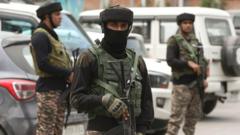"India's unsuccessful bid to block the IMF's bailout for Pakistan highlights broader concerns over funding protocols and geopolitical dynamics, revealing the complexities within international financing systems."
"India's Struggle with IMF: The Bailout Controversy for Pakistan"

"India's Struggle with IMF: The Bailout Controversy for Pakistan"
"Despite India's protests, the IMF grants a $1 billion bailout to Pakistan, raising concerns about the implications and influence on regional stability."
Last week, the International Monetary Fund (IMF) approved a sizeable $1 billion bailout for Pakistan, igniting a wave of dissent from India amid escalating military tensions between the two nuclear powers. The bailout is part of a larger $7 billion loan arrangement, which the IMF justified based on Pakistan's purported adherence to economic reform measures and recovery efforts. This controversial move also included a commitment from the IMF to bolster Pakistan’s economic resilience in the face of climate change and potential natural disasters, signaling further funding opportunities down the line.
In a pointed response, India expressed dismay over the IMF's decision, questioning the viability of such bailouts based on Pakistan's historical failures to effectively implement necessary reforms. India's objections also pointed to the potential misuse of funds for cross-border terrorism, a long-standing allegation that Pakistan consistently denies. India cautioned that the IMF was putting its own reputation at risk and undermining global values by extending financial assistance without stringent accountability.
Notably, some Pakistani analysts recognize the validity of India's critique about the nation's reliance on IMF assistance—Pakistan has sought financial help from the fund 24 times since 1958, suggesting systemic governance issues. Hussain Haqqani, a former Pakistani ambassador to the U.S., remarked that recurrently turning to the IMF indicates enduring structural challenges.
India, as a member of the 25-member IMF board, has limited ability to influence decisions. Representing a bloc of nations, including Sri Lanka, Bangladesh, and Bhutan, India currently holds only 2.6% of the voting rights in comparison to the 16.49% of the U.S. Moreover, IMF voting operates differently than a one-country-one-vote system; board members’ votes reflect their financial contributions, with greater weight afforded to wealthier nations.
Calls for reforming the IMF in line with fairer representation have gained traction, especially during India's G20 presidency in 2023. Recommendations included decoupling voting rights from financial contributions, yet tangible progress on these reforms remains elusive.
Additional complexities arise from the IMF’s response to conflicts, as evidenced by its recent loan to Ukraine, marking a departure from previously established guidelines for funding countries in war. Mihir Sharma of the Observer Research Foundation points out that this shift in policy undermines justifications for refusing Pakistan’s bailout.
Looking forward, the optimal channel for India to address its grievances may lie within the Financial Action Task Force (FATF) rather than the IMF, according to Haqqani. The FATF specializes in scrutinizing terrorism financing, with the power to place countries on grey or black lists that can hinder access to international funds. With Pakistan have been removed from the FATF grey list in 2022, India's chances of leveraging FATF to impose financial constraints are limited.
Moreover, experts emphasize caution regarding the calls to reform the IMF’s power dynamics, as it could inadvertently empower China over India in multilateral negotiations. Historical instances of Chinese vetoes against India’s initiatives underscore the delicacy of leveraging multilateral organizations for bilateral disputes.
As the geopolitical landscape continues to evolve, the interplay between India's assertive posturing against Pakistani aid and the IMF’s institutional protocols will remain a focal point of scrutiny in the realm of international finance and regional diplomacy.





















